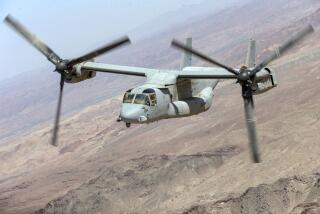Marine special forces squad awarded Navy Cross, Silver Stars
- Share via
CAMP PENDLETON — In a ceremony replete with praise for their courage and resourcefulness, four members of an elite Marine special forces squad received medals Monday for their actions during a lengthy firefight in Afghanistan.
But one key squad member, whose dedication and coolness under fire were noted in the official after-action report, was not in attendance: Posha, the military working dog.
The German shepherd was with the Marines when they landed in a helicopter-borne assault to clear out a Taliban command post and quickly found two pressure-plate bombs on the main route to the Taliban compound.
Once those two explosives were marked, the dog and his handler searched for booby traps around an enemy weapons cache. Posha also provided protection and “combat mentorship” to the Afghan army commandos who were teamed with the Marines.
And when Taliban fighters attacked from multiple locations with small-arms fire and rocket-propelled grenades, Posha did not flinch and instead offered comfort to wounded Marines and Afghan commandos.
Posha, who had also served in combat in Iraq, survived the daylong fight without a scratch. But after the Marine Special Operations Command unit returned to Camp Pendleton, Posha was diagnosed with cancer and had to be euthanized last year.
At Monday’s ceremony Sgt. William Soutra Jr., 27, received the Navy Cross for his actions in July 2010, for handling Posha, carrying the fight to the Taliban and directing the Afghan commandos.
Maj. James T. Rose, Staff Sgt. Frankie J. Shinost and Navy corpsman Patrick B. Quill received Silver Stars.
Rose risked enemy fire to direct a counterattack; Shinost rushed directly at the Taliban positions and called in air support; Quill tried desperately to save the life of a wounded Marine and helped carry the wounded to the evacuation helicopter as the battle raged.
The awards were presented by Navy Secretary Ray Mabus on behalf of President Obama. While the four were being singled out for their bravery, the awards, Mabus said, “are also honoring all of those with whom they have served.”
In talking later to reporters, Soutra said Posha “made me the Marine I am today.”
Posha, who was trained to sniff out bombs, “did his job the entire deployment. It’s been a year now, but it still hurts when I think about how he got cancer and had to be put down.”
Soutra said that Posha, during two combat deployments together, “was my best friend. He always reacted the same way. He saved my life.”
Soutra’s older brother, Joe, 30, an auto parts salesman, said that his brother enlisted in the Marine Corps to be near dogs. “Billy has always loved dogs, but mom never would let us have one,” he said. “When he said he was enlisting in the Marine Corps, we knew why: So he could have a dog.”
Rose said Posha and other working dogs “are combat multipliers and life-savers.” Their role in the special forces command is particularly significant, given the intensity of the missions. Rose’s unit had casualties in 18 of 19 missions.
“Every mission we went on was a gunfight from sunup to sundown,” Rose said.
In 2009, Soutra and Posha deployed to Iraq, where the two did so well that Soutra was meritoriously promoted, a rarity in the Marine Corps. In 2010, Soutra and Posha deployed to Afghanistan to be part of a unit assigned to strike at high-value targets of the enemy in the onetime Taliban stronghold of Helmand province.
Now Soutra is training with another dog in hopes of redeploying to Afghanistan. But Posha will always be special — Soutra has Posha’s ashes in an urn under his bed.
“When it’s my time to go, I want us to be buried together,” Soutra said, in a quiet voice with touches of his upbringing in Worcester, Mass. “That way we will always be together.”
More to Read
Sign up for Essential California
The most important California stories and recommendations in your inbox every morning.
You may occasionally receive promotional content from the Los Angeles Times.













